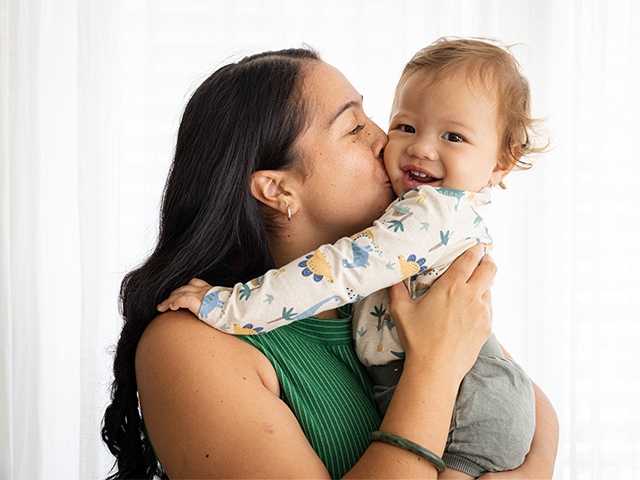When your child stays overnight.
When your child has to stay overnight in our hospital, your whole family is in our care.

Whether it’s the first time or tenth, having to admit your child to a pediatric hospital for an overnight stay can cause stressful emotions. You may feel worried, afraid, angry, or overwhelmed. We want you to know we understand your concerns, and we’re here for you.

Healing hands. Caring hearts.
We're not just here to provide medical care. There’s no doubt your child is the most important person to us, but we strive to connect with you and the rest of your family as well.
We know a hospital is not an easy place to conduct “family as usual.” That’s why we’ve created an environment that is tailored to the unique needs of every child and their family. From activity time, school time, and rest time, we have programs and resources to support everyone’s well-being, especially your child.
Our clinicians and experts are recognized for excellence and innovation.
Helen DeVos Children’s Hospital is ranked among U.S. News & World Report’s Best Children’s Hospitals and designated as a Level One Children's Surgery Center by the American College of Surgeons and received Magnet Recognition® for nursing excellence.
The Gerber Foundation Neonatal Center is a Level IV neonatal intensive care unit. It is the largest neonatal unit in the state of Michigan and is one of the nation's top 10 largest contiguous neonatal centers.

Why is your child an inpatient, and what does that mean?
Being admitted—or inpatient—means a doctor wants your child to stay overnight in the hospital to be under the care of our staff until it is safe for your child to go home, or to another health care setting.
There are multiple reasons why your child could be admitted. Perhaps a test, a procedure, a surgery, or chronic illness warrants around-the-clock observation. Very often, though, a hospital stay for a child comes unexpectedly, after an emergency room visit.
Family support from the Child and Family Life team.
Families are not just visitors. They are active participants in a child’s care team. Our Child and Family Life team strives to provide the whole family with the emotional support needed during an inpatient stay.
You'll meet this team during your stay. The Child and Family Life team helps with separation anxiety, new diagnosis education, and preparation for procedural support. Their goal is to ensure your entire hospital visit is as comfortable as possible. That could mean organizing family games or movie nights to making sure siblings get to participate in activities, get homework help, and even get their favorite foods. The Child and Family Life team cares for your child, but also everyone in the family.
Here’s why our Collaborative Care model matters.
Our hospital works in a collaborative way to offer your child and your family the benefits of open communication, knowledge sharing, and our expertise.
Your child is assigned a care team involving different health care professionals—nurses, social workers, and specialists. They all work together in a well-coordinated way to execute a treatment plan they agree on, while sharing updates with each other along the way. It’s an innovative approach that invites different perspectives and experiences. Studies have shown that when everyone is on the same page, there are fewer miscommunications, more opportunities for informed decisions, and shorter hospital stays.
Health Information at Your Fingertips.
Manage your child’s health by requesting access to be their MyChart proxy.
